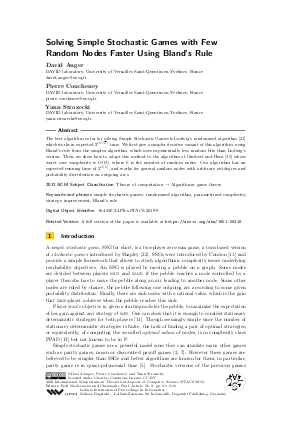Solving Simple Stochastic Games with Few Random Nodes Faster Using Bland’s Rule
Authors David Auger, Pierre Coucheney, Yann Strozecki
-
Part of:
Volume:
36th International Symposium on Theoretical Aspects of Computer Science (STACS 2019)
Part of: Series: Leibniz International Proceedings in Informatics (LIPIcs)
Part of: Conference: Symposium on Theoretical Aspects of Computer Science (STACS) - License:
 Creative Commons Attribution 3.0 Unported license
Creative Commons Attribution 3.0 Unported license
- Publication Date: 2019-03-12
File

PDF
LIPIcs.STACS.2019.9.pdf
- Filesize: 0.52 MB
- 16 pages
Document Identifiers
Related Versions
-
A full version of the paper is available at https://arxiv.org/abs/1901.05316.
Subject Classification
ACM Subject Classification
- Theory of computation → Algorithmic game theory
Keywords
- simple stochastic games
- randomized algorithm
- parametrized complexity
- strategy improvement
- Bland’s rule
Metrics
- Access Statistics
-
Total Accesses (updated on a weekly basis)
0PDF Downloads0Metadata Views
Abstract
The best algorithm so far for solving Simple Stochastic Games is Ludwig’s randomized algorithm [Ludwig, 1995] which works in expected 2^{O(sqrt{n})} time. We first give a simpler iterative variant of this algorithm, using Bland’s rule from the simplex algorithm, which uses exponentially less random bits than Ludwig’s version. Then, we show how to adapt this method to the algorithm of Gimbert and Horn [Gimbert and Horn, 2008] whose worst case complexity is O(k!), where k is the number of random nodes. Our algorithm has an expected running time of 2^{O(k)}, and works for general random nodes with arbitrary outdegree and probability distribution on outgoing arcs.
Cite As Get BibTex
David Auger, Pierre Coucheney, and Yann Strozecki. Solving Simple Stochastic Games with Few Random Nodes Faster Using Bland’s Rule. In 36th International Symposium on Theoretical Aspects of Computer Science (STACS 2019). Leibniz International Proceedings in Informatics (LIPIcs), Volume 126, pp. 9:1-9:16, Schloss Dagstuhl – Leibniz-Zentrum für Informatik (2019)
https://doi.org/10.4230/LIPIcs.STACS.2019.9
BibTex
@InProceedings{auger_et_al:LIPIcs.STACS.2019.9,
author = {Auger, David and Coucheney, Pierre and Strozecki, Yann},
title = {{Solving Simple Stochastic Games with Few Random Nodes Faster Using Bland’s Rule}},
booktitle = {36th International Symposium on Theoretical Aspects of Computer Science (STACS 2019)},
pages = {9:1--9:16},
series = {Leibniz International Proceedings in Informatics (LIPIcs)},
ISBN = {978-3-95977-100-9},
ISSN = {1868-8969},
year = {2019},
volume = {126},
editor = {Niedermeier, Rolf and Paul, Christophe},
publisher = {Schloss Dagstuhl -- Leibniz-Zentrum f{\"u}r Informatik},
address = {Dagstuhl, Germany},
URL = {https://drops.dagstuhl.de/entities/document/10.4230/LIPIcs.STACS.2019.9},
URN = {urn:nbn:de:0030-drops-102488},
doi = {10.4230/LIPIcs.STACS.2019.9},
annote = {Keywords: simple stochastic games, randomized algorithm, parametrized complexity, strategy improvement, Bland’s rule}
}
Author Details
References
-
Daniel Andersson, Kristoffer Arnsfelt Hansen, Peter Bro Miltersen, and Troels Bjerre Sørensen. Deterministic graphical games revisited. In Conference on Computability in Europe, pages 1-10. Springer, 2008.

-
Daniel Andersson and Peter Bro Miltersen. The complexity of solving stochastic games on graphs. In International Symposium on Algorithms and Computation, pages 112-121. Springer, 2009.

-
David Auger, Pierre Coucheney, and Yann Strozecki. Finding optimal strategies of almost acyclic simple stochastic games. In International Conference on Theory and Applications of Models of Computation, pages 67-85. Springer, 2014.

-
Robert G Bland. New finite pivoting rules for the simplex method. Mathematics of operations Research, 2(2):103-107, 1977.

-
Cristian S Calude, Sanjay Jain, Bakhadyr Khoussainov, Wei Li, and Frank Stephan. Deciding parity games in quasipolynomial time. In Proceedings of the 49th Annual ACM SIGACT Symposium on Theory of Computing, pages 252-263. ACM, 2017.

-
Krishnendu Chatterjee, Luca de Alfaro, and Thomas A Henzinger. Termination criteria for solving concurrent safety and reachability games. In Proceedings of the twentieth annual ACM-SIAM symposium on Discrete algorithms, pages 197-206. SIAM, 2009.

-
Krishnendu Chatterjee and Nathanaël Fijalkow. A reduction from parity games to simple stochastic games. In GandALF, pages 74-86, 2011.

-
Taolue Chen, Vojtěch Forejt, Marta Kwiatkowska, David Parker, and Aistis Simaitis. Automatic verification of competitive stochastic systems. Formal Methods in System Design, 43(1):61-92, 2013.

-
Taolue Chen, Marta Kwiatkowska, Aistis Simaitis, and Clemens Wiltsche. Synthesis for multi-objective stochastic games: An application to autonomous urban driving. In International Conference on Quantitative Evaluation of Systems, pages 322-337. Springer, 2013.

-
Anne Condon. On Algorithms for Simple Stochastic Games. In Advances in computational complexity theory, pages 51-72, 1990.

-
Anne Condon. The complexity of stochastic games. Information and Computation, 96(2):203-224, 1992.

-
Decheng Dai and Rong Ge. New results on simple stochastic games. In International Symposium on Algorithms and Computation, pages 1014-1023. Springer, 2009.

-
Kousha Etessami and Mihalis Yannakakis. On the complexity of Nash equilibria and other fixed points. SIAM Journal on Computing, 39(6):2531-2597, 2010.

-
Oliver Friedmann. An exponential lower bound for the parity game strategy improvement algorithm as we know it. In Logic In Computer Science, 2009. LICS'09. 24th Annual IEEE Symposium on, pages 145-156. IEEE, 2009.

-
Hugo Gimbert and Florian Horn. Simple stochastic games with few random vertices are easy to solve. In Foundations of Software Science and Computational Structures, pages 5-19. Springer, 2008.

-
Nir Halman. Simple stochastic games, parity games, mean payoff games and discounted payoff games are all LP-type problems. Algorithmica, 49(1):37-50, 2007.

-
Thomas Dueholm Hansen and Uri Zwick. An improved version of the Random-Facet pivoting rule for the simplex algorithm. In Proceedings of the forty-seventh annual ACM symposium on Theory of computing, pages 209-218. ACM, 2015.

-
Alan J Hoffman and Richard M Karp. On nonterminating stochastic games. Management Science, 12(5):359-370, 1966.

-
Rasmus Ibsen-Jensen and Peter Bro Miltersen. Solving simple stochastic games with few coin toss positions. In European Symposium on Algorithms, pages 636-647. Springer, 2012.

-
Gil Kalai. A subexponential randomized simplex algorithm. In Proceedings of the twenty-fourth annual ACM symposium on Theory of computing, pages 475-482. ACM, 1992.

-
Walter Ludwig. A subexponential randomized algorithm for the simple stochastic game problem. Information and computation, 117(1):151-155, 1995.

-
Lloyd S Shapley. Stochastic games. Proceedings of the National Academy of Sciences of the United States of America, 39(10):1095, 1953.

-
Colin Stirling. Bisimulation, modal logic and model checking games. Logic Journal of IGPL, 7(1):103-124, 1999.

-
Rahul Tripathi, Elena Valkanova, and VS Anil Kumar. On strategy improvement algorithms for simple stochastic games. Journal of Discrete Algorithms, 9(3):263-278, 2011.

